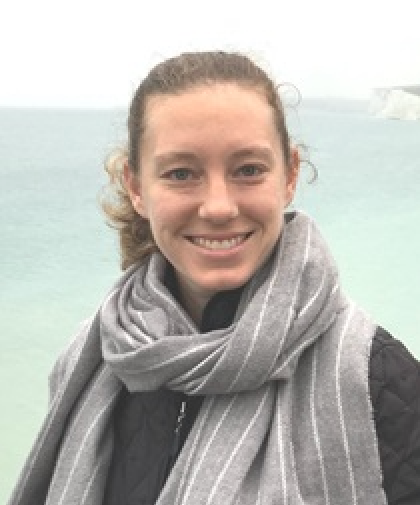Meet the Scientist
Dr. Allie McClure
Assistant Professor
Department of Biochemistry and Molecular Genetics

How do our cells stay on time and not get delayed when making copies of themselves?
Every cell in our bodies must make copies of themselves to keep us alive. Did you know that the genetic information within each cell that must be copied (your DNA) is the equivalent of a 200,000 page book?!?
Dr. Allie McClure is a scientist here on the CU Anschutz medical campus who runs a research lab in the Department of Biochemistry and Molecular Genetics. She is focused on learning all about how cells replicate or make copies of themselves. Allie and her research team want to understand how cells copy all of their DNA on time and without mistakes to pass down to the next generation of cells.
Dr. Allie McClure is a scientist here on the CU Anschutz medical campus who runs a research lab in the Department of Biochemistry and Molecular Genetics. She is focused on learning all about how cells replicate or make copies of themselves. Allie and her research team want to understand how cells copy all of their DNA on time and without mistakes to pass down to the next generation of cells.
Cells are usually on a tight schedule when replicating their DNA
As you might imagine, the process of cell replication is regulated and on a strict schedule, somewhat like writing an article for a newspaper on a tight deadline. You can think of the process of replication like a newspaper journalist interviewing multiple experts about an important new law and then reporting, or replicating, those facts in a news article. The journalist is expected to finish the article for publication in the newspaper by a certain deadline so that the public has accurate information about how the law will apply to them on time before the law goes into effect. Likewise, a cell has a strict deadline to finish replicating all of its DNA before the cell divides.
Allie’s lab has been working on a surprising discovery - sometimes things stall, and replication of the DNA does not finish on schedule! Her team has seen brand new copies of DNA being made when the cell has already begun to divide, well after the typical deadline for copying DNA has passed. This delayed timing of replication has brought up a lot of questions that the lab is working hard to answer.
Allie’s lab has been working on a surprising discovery - sometimes things stall, and replication of the DNA does not finish on schedule! Her team has seen brand new copies of DNA being made when the cell has already begun to divide, well after the typical deadline for copying DNA has passed. This delayed timing of replication has brought up a lot of questions that the lab is working hard to answer.
Why might a cell become delayed or stalled when replicating its DNA?
Thinking back to the newspaper journalist, missing the deadline may be due to simple procrastination or not finishing a task on time. But perhaps the delay is due to a problem with the audio equipment?! Maybe the recording of the interviews were distorted, and the journalist was stuck without having the precise quotes to use from their expert sources. So, they must seek help from a specialist in recording devices to recover the audio. Or, maybe their interview notes were pushed off the desk and scattered all out of order, requiring more time and help from co-workers to reorganize everything and put it back in order. No matter which issue came up, the deadline was missed, the journalist required additional help from others, and the article was submitted later than expected.
Despite the issues that might pop up to delay the completion of the article on time, it is also critical that the information the journalist reports is accurate so that inaccurate information does not spread to the public.
In a similar way, Allie’s lab is investigating various cell factors that might help a stalled cell restart the replication process after the original replication deadline has passed.
Despite the issues that might pop up to delay the completion of the article on time, it is also critical that the information the journalist reports is accurate so that inaccurate information does not spread to the public.
In a similar way, Allie’s lab is investigating various cell factors that might help a stalled cell restart the replication process after the original replication deadline has passed.
Why is the research that Allie and her team work on in their lab so important?
Cancer cells spread in our bodies when cell replication makes a lot of errors and does not follow the usual schedule. This is why learning how a cell can overcome setbacks in replication is important – one thing this research may help us do is figure out ways to prevent cancer from
growing. By working to understand the ways that cells fix stalling during replication, Allie and her team hope to apply their findings to improve our knowledge of how cells become cancerous so that we can develop treatments to stop the spread of cancer.
growing. By working to understand the ways that cells fix stalling during replication, Allie and her team hope to apply their findings to improve our knowledge of how cells become cancerous so that we can develop treatments to stop the spread of cancer.
If you want to learn more about the scientist, please head to their official CU webpage.